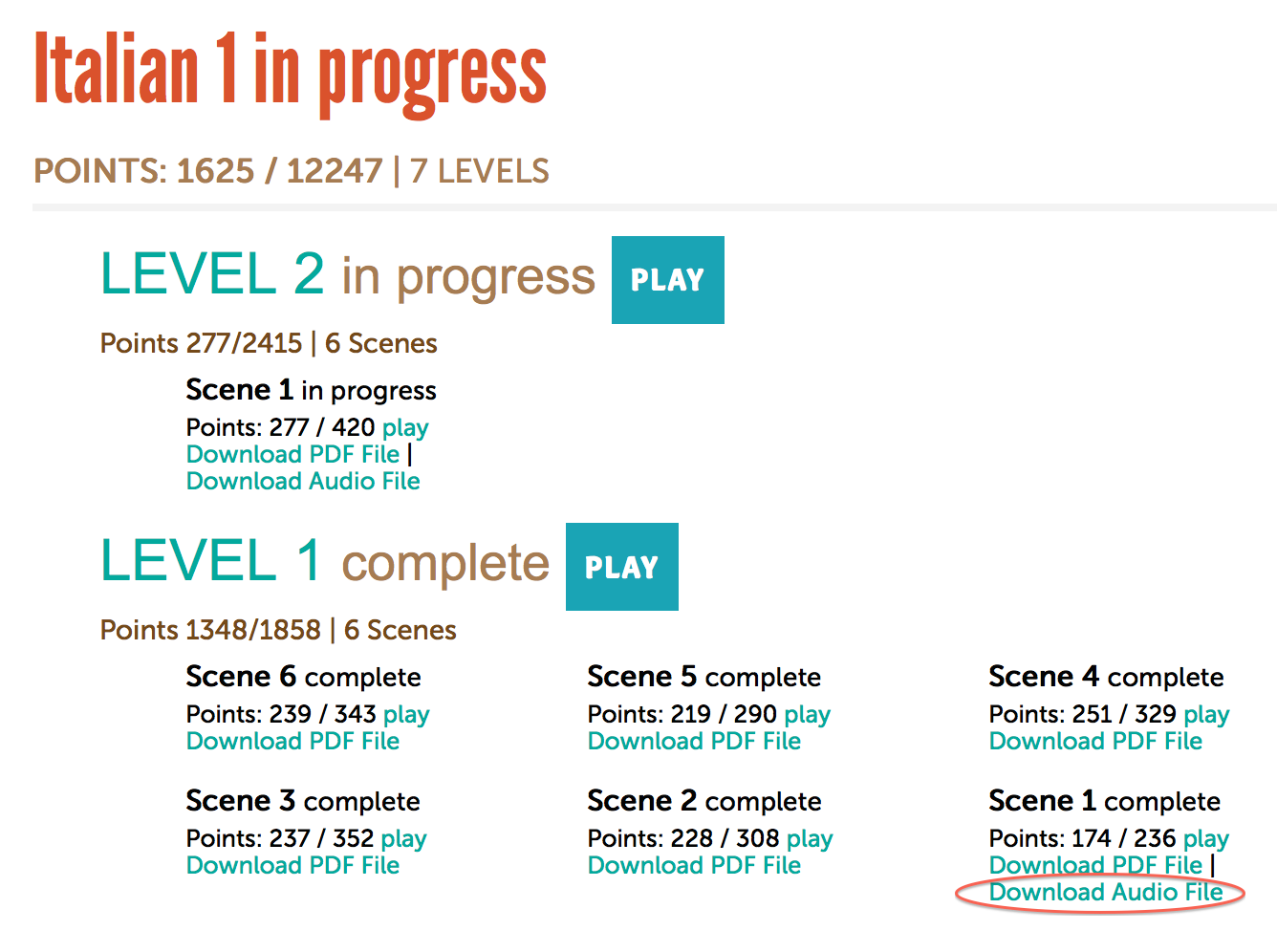How to play and learn?
Download MP3 Audio Files and Vocabulary/Phrase lists:
You can listen to "The Story" by clicking on your language in the Podcast link, or when you are inside a game, as described below:
On the example screenshot of the "Italian in Progress" page (below) you can see all Scenes that have been played or started.
you can see all Scenes that have been played or started.
Under each Scene you see "Download PDF File", the vocabulary and phrase list of the Scene. Many find it helpful having a hard copy of the vocabulary and phrases.
Under Scene 1 of each Level, you can "Download Audio File", the MP3 audio of each level. Listening to the dialog of each level will greatly improve your listening and comprehension skills.
Note also that the large "PLAY" button will get you to the last Scene you started in each level, the small blue "play" under each Scene lets you select any Scene to play again - and then, on the Menu button (top right), you can select the game you want to play.
Some suggestions:
-
Play only one (1) NEW Scene per day, and - if you have 20-30 minutes - start by playing the PREVIOUS Scene, or at least the Dialogue of the previous Scene. If you have some background in the chosen language, you can always move through the games and Scenes more rapidly until your mistakes start to slow you down.
-
With the first games, "Memory", "Balloon" Games, etc. pay attention to the SPELLING of the foreign words, accents (French, Spanish, French), Umlauts (German) as well as the abbreviations (see below) - all information you will need in later games.
-
Re-play any of the games of a previous scene, for which you scored less than 100%.
-
Play some games every day to get into the learning habit. (Also note that the Quick Games can be played without even logging in.) You’re free to re-play any Scenes or games. Instead of clicking the "Play French, German, etc." icon (which takes you to the last Scene you played), click on "see details" and the desired Scene. As the introduction plays, click anywhere on the map, then on the Menu button, top right and select the game you want to replay.
-
Don’t worry, if you don’t know yet the English meaning in the “Balloon Words,” or “Say It” games. Just concentrate on the sounds and the melody of the language.
-
If you are curious, you can “roll over” the foreign words in “The Story” to see the English translation of every sentence. If you click on the sentence, you’ll hear it spoken again.
-
In some of the other games (e.g. "Memory Game", “Deal no Deal”, “Shooting Gallery”), you can listen again to the foreign word or phrase by just clicking on it.
-
Repeat the native speaker's words and phrases whenever you can in any game - BEFORE the native speaker, if you can, and AFTERWORDS to correct yourself.
-
Practice your pronunciation by always repeating the words, phrases, and sentences of the native speaker. Keep practicing until you feel that you're getting close to the pronunciation you hear.
-
In the Writing Game you can use your keyboard or click on the on-screen letters that are provided. For special foreign letters you should use the on-screen letters. (The iPad, will not show you the keyboard, so you'll be limited to the on-screen letters.)
-
The bottom of the playing screen shows your progress. The target percentage for continuing to the next scene increases from level to level.
-
In the games, pay attention to the abbreviations that appear directly behind the English word. They will tell you which form of the foreign word you should use.
-
There are Twitter, G+, Facebook and other links, if you want to use your score reports to keep you motivated!
After completing a Level (six Scenes) listen to the Podcast. If you don't understand a Scene perfectly, replay it.
Listen to the Podcast of the next level and find out how much you can already understand or guess. Then start to practice with the Scenes of that Level.
Abbreviations:
f: feminine
m: masculine
n: neuter (for German, Spanish)
pl: plural
indef.: indefinite
fam.: familiar
form.: formal
Grammar:
-
In the “Deal No Deal” game you’ll find brief pronunciation, grammar, and culture tips. By further discovering some of the grammar rules yourself, you’ll greatly enhance your learning.
-
Our “Dictionary,” which can also be accessed at http://www.gamesforlanguage.com/dictionary has additional explanations for many of the words and phrases used in the “Story.”
-
For further study and explanations of words, the Online Language Dictionaries of www.wordreference.com (and for German conjugations www.verbformen.de) are excellent sources.
